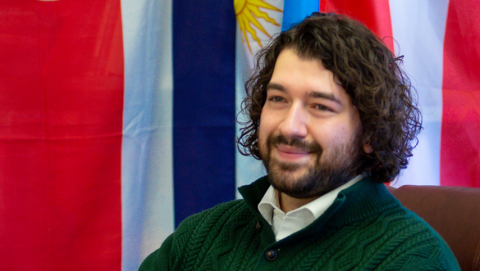Armando Quiroz Asks, “How Do We Define Language Mastery?”

When Armando Quiroz was growing up, Spanish was a gateway to his community, how he spoke with his grandmother and how he paid attention in church. “Spanish was a tool to feel connection,” he says. As he prepared for a career in education, he realized that he could bring these connections to his work life, too.
After his first year as a Spanish teacher, Quiroz found a master’s program in Madrid, left the security of the tenure track and moved to Spain. He wanted to improve his fluency and experience the cultures he was teaching his students about. While in Madrid, Quiroz earned a master's in Spanish education and ended up staying for a second year, meeting people from all over the world. “When I came back to the States, I wanted to encourage my students to have that kind of experience because it was just so enriching.”
As the supervisor of world languages in a New Jersey school district, Quiroz oversees the Spanish, Latin and French programs from kindergarten to 12th grade. “Languages and language learning bring me so much joy,” he says. ”It’s my goal to help students reach higher levels of proficiency in their language of study.”
As part of his doctoral degree in the COE’s Educational Leadership program, Quiroz is exploring areas of research that blend educational leadership and change leadership. “Broadly, what I'd like to explore is which leadership traits impact higher levels of language proficiency for students,” he says. In other words, what do leaders need to know or do in order for more students to reach higher levels of mastery in a second or third language? Within that inquiry, he says, “There are still so many layers that I have to peel back to come up with my research focus.”
One of those layers is how proficiency is measured. Is successful proficiency attainment the ability to order at a restaurant? Is it passing an exam? “It is so much more than that,” Quiroz says, He’s conducting a research project outside of his dissertation, with the help of Dr. Craig Hochbein, investigating the concept of recognition for biliteracy in two or more languages for high school graduates.
When he started his doctoral work, Quiroz imagined he’d be doing qualitative study. “That’s more my thing,” he says. “And I was really worried about taking the stats courses because it had been so long.” But when he took Dr. Grace Caskie’s class, something just clicked. “Now I find myself looking at mixed methods–for this project, it would rely on linear regression.’ Quiroz credits Caskie for changing his approach to research. “I went through three quantitative stats classes and enjoyed them,” he says.
Many new graduate students see statistics as difficult and research as unrelated to improving their personal leadership and practice. Hochbein has seen firsthand how Quiroz’ experience with statistics broadened and deepened his ability to learn more about a topic that is important to him. “Armando’s experience is a great example of how our Educational Leadership program blends research and practice, and can actually influence educators, schools, and their students.”
Quiroz is still figuring out the role statistics will play in his dissertation–whether it will be in the type of feedback that leaders provide to language teachers, whether it will be aligned to best practices, or recording instructional mismatch (often world language leaders are not actually certified in languages). “I haven't yet found how I'm going to marry leadership and languages, but I think this passion project [with Hochbein] is going to help me analyze which leadership characteristics might be correlated with successful languages learning.”
Another aspect of Quiroz’s research is looking at the Seal of Biliteracy. The Seal can be awarded to students by a school prior to high school graduation. Attaining the Seal is becoming increasingly beneficial to college applicants. “Our district has accepted that this assessment helps determine which students are proficient or not, but there's not a whole lot of uniformity across school districts or across the states,” he says. “The information on who gets the Seal and who doesn't is incredibly informative for our research.”
Quiroz wants to have a role in transformational leadership–of a school district or perhaps one day even more broadly at the state level or the department of education. That's what piqued his interest in COE’s Educational Leadership program. “I was very interested in Lehigh because I wanted an in-person experience and I also wanted to produce a dissertation,” he says. “These factors, along with a focus on critical thinking, contributed to my decision to choose Lehigh.”
Quiroz hopes that his research will help to develop standardization in how bilingual mastery is assessed. And ultimately, he hopes that his work will help to define policy.
Not all states require a second language as part of the high school curriculum. New Jersey is among the states that do, but they only require one year. “Yet our standards say that students have to reach a certain level of proficiency which is not a reasonable expectation of a single year of study,” Quiroz says.
Quiroz also hopes that more and more schools will embrace new approaches to language teaching–centered on communication, reading, writing, listening and speaking. “This approach centers on students using language spontaneously, affording learners authentic, global experiences,” he says.